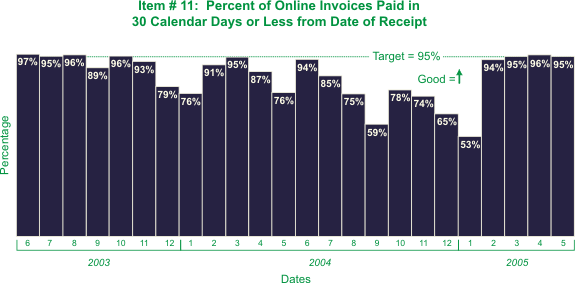Innovations
Dashboard Drill Down
Payables Administration
by Karl Kraber and Keli Johnson
The heartbeat of process improvement is best understood by the term “Kaizen.” Originally a Japanese management concept for incremental (gradual, continuous) change (improvement), Kaizen is actually a way of life philosophy, assuming that every aspect of our life deserves to be constantly improved. In business, it means that a process or system is never fixed “once and for all,” but needs to be constantly and incrementally improved. This is also the idea behind Plan-Do-Check-Act (PDCA). Once a major improvement activity has implemented, the wheel of PDCA is constantly turned.
Today’s article focuses on a group that represents the Kaizen and PDCA philosophy and how their continuous improvement is evident on the departmental dashboard. The purpose of this “drilldown” is to examine a part of Financial Management through a departmental dashboard to focus on an ongoing improvement that takes us behind the numbers and tells the story. The group is Payables Administration. The process is invoice processing. This is their story.
As the chart below shows, during 2004 the Payables Administration group had been struggling to process invoices within 30 days of the invoice receipt date. Based on measurements used for their dashboard, it was obvious that Payables Administration Processing was behind. They realized that the processes they were using were not working. They received a number of customer complaints and employee morale deteriorated. Definitely, it was time to consider a serious rapid problem solving technique. Consequently, Financial Services brought a Payables work group together to address the problems. The work group established common goals and expectations. They decided that they would do what they called “process concentration” twice every week. Process concentration is four hours dedicated solely to processing invoices. During these “concentration times” employees have no outside distractions. That is, they are required to ignore the phone and cannot set up other meetings.

At the beginning, the Payables workgroup suggested different ideas about how they wanted to improve this process. One idea was to change the filing method for batches of invoices waiting to be processed. It was changed to a method of oldest invoices first, rather than by batch number. Another process change was to put aside the “problem” invoices that needed more time, focus on the easy ones, and then, later, resolve the problems. This was an effective application of the Pareto Principle: 20% of the work caused by 80% of the problems. The team then set up a two-tier goal structure to accomplish the requirement of paying the invoices within 30 days: 1) process the “non-problem” invoices within two weeks and 2) resolve the problem invoices within the remaining two weeks. Within a month, the backlog of invoices was eliminated. This shows up on the chart at February 2005.
This team hasn’t been complacent with their newly achieved success. For example, they implemented a plan to have the leader send out emails at the end of each day to provide the workgroup with a summary of where they were and what needed to be focused on the following day. In addition, they arranged with the Customer Service group to receive help from students to log in faxes while a Customer Service person processed invoices.
During the last four months, they have continued to make improvements, especially when there are vacant positions and new employees. In the event that there is a vacant position, the team has put together back-up positions. When a person knows they are leaving, going on vacation or planning to have sick leave, they meet with their assigned “back-up” along with the supervisor to review any outstanding or pending work on their desk. In regards to a new employee, the group plans out who can help fill in for certain duties and offers suggestions on how to best utilize the student assistants while the new employees are in training.
Process improvement is never-ending. Payables Administration knows that and, while continuing to make the incremental changes, they will also be starting another focused process improvement effort soon.
|



